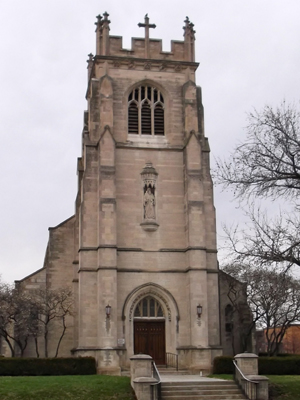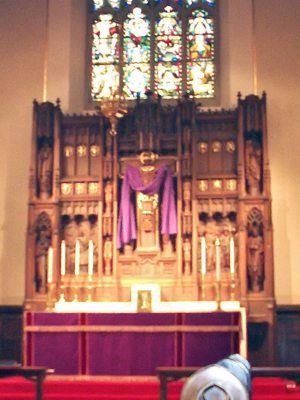| |
 |
 |
 |
| Comment on this report, or find other reports. |
 |
| Our Mystery Worshippers are volunteers who warm church pews for us around the world. If you'd like to become a Mystery Worshipper, start here. |
 |
| Find out how to reproduce this report in your church magazine or website. |
|
|
| 2675: St Paul's
Cathedral, Springfield, Illinois, USA |
 |
 |
 |
Mystery
Worshipper: Paterfamilias.
The church:
Cathedral
Church of St Paul the Apostle, Springfield, Illinois, USA.
Denomination:
The
Episcopal Church, Diocese
of Springfield.
The building:
The church is in the English Gothic style, with a divided chancel.
The parish's current building was consecrated in 1913. There
is an extensive set of stained glass windows installed from
1912-1982, executed by Willet Studios of Philadelphia, one of
the oldest studios in North America and suppliers of stained
glass to such strange bedfellows as the Cadet Chapel at the
United States Military Academy at West Point and the New York
City subway system. The windows in the chancel area illustrate
themes from the Rosary, somewhat unusual for an Episcopal church.
Behind the altar is a reredos carved from Black Forest walnut
by Alois Lang, a German woodcarver. This dates from the 1920s.
In the center of the reredos is a Christus Rex, veiled for Passiontide,
surrounded by statues of other biblical figures.
The church:
Episcopalians began meeting in Springfield in 1832, and the
parish of St Paul, Springfield, was organized in 1835. The parish's
first rector, the Revd Charles Dresser, officiated at the marriage
of Abraham Lincoln to Mary Todd. There is a strong emphasis
on hunger ministries, in addition to sacramental formation,
Christian education, music, and social activities. There are
two Sunday eucharists, at 8.00 (Rite I) and 10.30 (Rite II).
Weekday eucharists are celebrated each Tuesday and Thursday;
Wednesday evenings in Lent there are Stations of the Cross,
eucharist, Soup Supper, and benediction.
The neighborhood:
Springfield is the largest city in central Illinois, with a
metropolitan area population of some 208,000. It is the capital
of the state of Illinois. Since Abraham Lincoln lived in Springfield
from 1837-1861 (when he became President), there are a number
of tourist attractions related to one of our most famous Presidents.
It is also on the old Route 66, immortalized by the television
series of that name some decades back.
The cast:
The Very Revd Gus Franklin, retired dean and assisting priest,
was celebrant and homilist. Barber Potts, M.Div., chief verger
and master of liturgical ceremonies, served in that capacity.
The names of the organist, vested deacon and subdeacon were
not noted in the bulletin.
The date & time:
Fifth Sunday in Lent, April 6, 2014, 10.30am.
What was the name of the service?
Solemn High Mass (Rite II).
How full was the building?
In a building that could hold, I would estimate, about 400, there were about 75 present, including those in the chancel.
Did anyone welcome you personally?
I was warmly welcomed by a gentleman who introduced himself
as Kevin. He gave me a bulletin, and then, when he noticed the
insert containing a hymn not in the hymnal was missing, walked
to another entrance to pick up a copy for me. After the service,
he saw me in the parking lot and again told me how glad he was
I had worshiped with them; we had a nice conversation at that
point.
Was your pew comfortable?
Very comfortable, with kneelers below the pews in front of us.
How would you describe the pre-service
atmosphere?
Quiet and reverential.
What were the exact opening words of the
service?
"Bless the Lord, who forgives all our sins," with the response
"His mercy endures forever," the opening Lenten acclamation
in the 1979 Prayer Book.
What books did the congregation use during the
service?
The Prayer Book 1979, the Hymnal 1982, and
the bulletin containing the lessons and some bits of service
music not in the hymnal.
What musical instruments were played?
Mostly organ, but also guitar, which accompanied the fraction
anthem, and piano on the communion hymn ("I Am The Bread of
Life").
Did anything distract you?
This Lutheran continues to be baffled by the distinctly Anglican tradition of vergers. I had always thought they were a feature of "low church" Anglicanism, but apparently not.

Was the worship stiff-upper-lip, happy clappy, or
what?
High, but not stuffy. Priest, deacon and subdeacon were vested
in chasuble, dalmatic, and tunicle, respectively. Incense was
used at the gospel procession and from the offertory until the
beginning of communion. Bells were rung before the institution
narrative and at the elevations. We received communion kneeling
at the altar rail. Much of the liturgy was chanted. On the other
hand, the peace was shared enthusiastically, and at some length.
Music was largely traditional.
Exactly how long was the sermon?
11 minutes.
On a scale of 1-10, how good was the preacher?
8 – The retired dean is a very accomplished public speaker.
Nothing dramatic, but easy to follow.
In a nutshell, what was
the sermon about?
Dean Franklin focused on putting the gospel for Lent V (the
raising of Lazarus, from John 11) into the context the gospels
for the four preceding Sundays, all from John. (He noted that
usually in Year A of the Revised Common Lectionary we read from
Matthew's gospel.) These four readings are all about baptism.
Lent originally began as a season in the church year where candidates
were prepared for baptism.
Which part of the service
was like being in heaven?
Several things: a carefully prepared and executed liturgy; the
spritely tempo at which the organist took the final hymn ("If
thou but trust in God"), which kept it from sounding as dour
as it sometimes does; and the role the parish allows for its
youngest members – two young folks who couldn't have been
older than eight years took up the collection.
And which part was like
being in... er... the other place?
Well, they are a bit close to the train tracks, and the prelude
became a duet for organ and obbligato train whistle. And I was
surprised that the deacon performed none of the liturgical roles
of a deacon (reading the gospel, pronouncing the dismissal,
etc.). He was reduced to holding the gospel book while the celebrant
read the gospel, and administering the chalice.
What happened when you hung around after the service looking lost?
A very nice woman stopped to talk, said that she was so glad
that I worshipped with them, and invited me to coffee hour.
She was most welcoming, and we had a nice chat.
How would you describe the after-service
coffee?
I had spent Saturday evening in Springfield to break up a ten-hour
road trip. I still had five and a half hours to go, and as it
was already 12.45 in my home time zone when the service ended,
I felt I needed to get on the road.
How would you feel about making this church your regular (where 10 = ecstatic, 0 = terminal)?
8 – If I were to move to Springfield, I would look first
for a Lutheran parish. But if none of them passed muster, I
suspect I could be quite happy at St Paul's.
Did the service make you feel glad to be a
Christian?
Yes, indeed. I had not been in an Episcopal church for a couple of years, and it was good to be back in the company of our full-communion partners.
What one thing will you remember about all this in seven days' time?
The friendliness of this congregation. |
|
|
 |
 |
 |
| We rely on voluntary donations to stay online. If you're a regular visitor to Ship of Fools, please consider supporting us. |
 |
 |
 |
| The Mystery Pilgrim |
 |
| One of our most seasoned reporters makes the Camino pilgrimage to Santiago de Compostela in Spain. Read here. |
 |
 |
 |
| London churches |
 |
| Read reports from 70 London churches, visited by a small army of Mystery Worshippers on one single Sunday. Read here. |
| |
|
|
|
|


